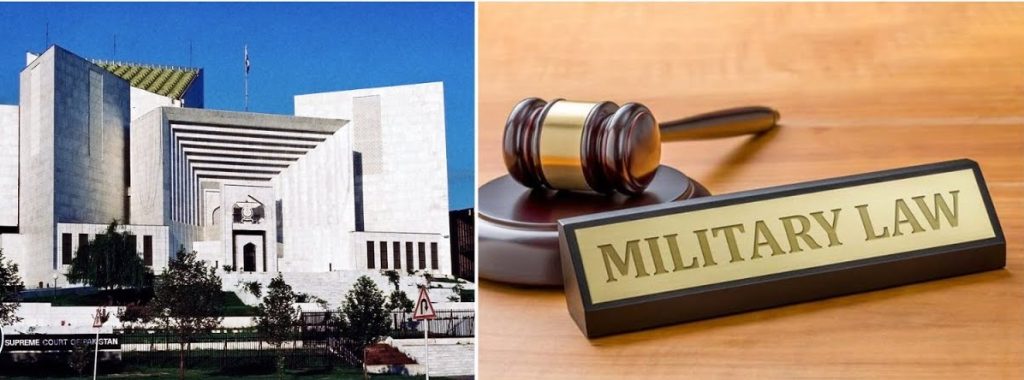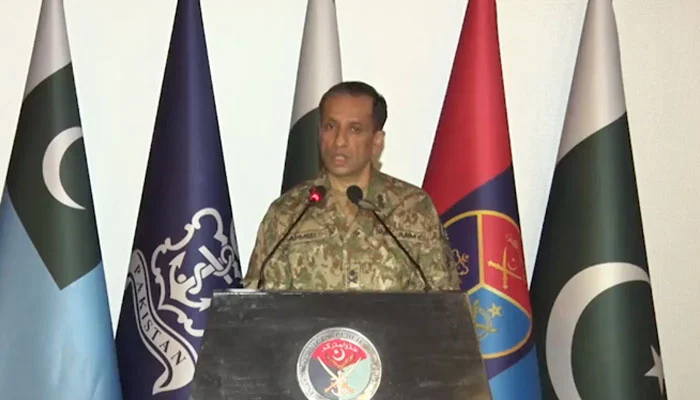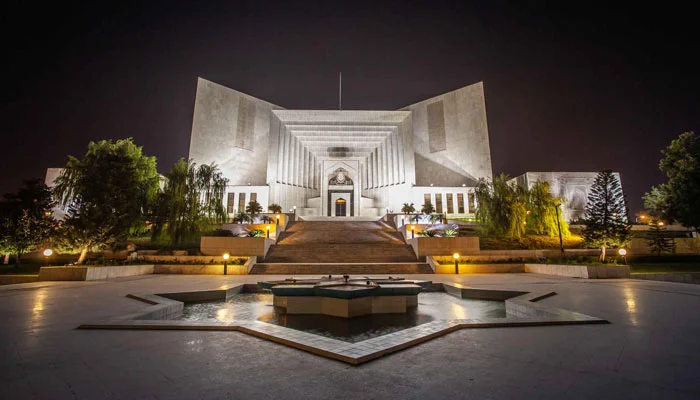
SC turns down pleas to stay civilians’ trial in military courts
The CJP ordered that all the suspects should be able to talk to their family members on Eidul Azha.
“Initially, they were detained under Section 2(d)(ii) but the Section 2(d)(i) may also be applicable,” AGP Awan
ISLAMABAD ( Web News )
The Supreme Cour Tuesday refused a request to stay the trial of civilians in military courts after Attorney General for Pakistan (AGP) Mansoor Awan’s assurances and adjourned the hearing sine die.
The AGP rebutted the PTI chief’s counsel Uzair Bhandari when he referred to army media wing’s statement that the trial had already begun and claimed that the trial had yet to start. The AGP made the claim during the hearing of the petitions filed against the trial of civilians in military courts by the PTI chairman, former chief justice Jawwad S. Khawaja, senior lawyer Aitzaz Ahsan and five civil society members, including Piler Executive Director Karamat Ali. The petitioners have prayed the apex court to declare the trial of civilians in military courts unconstitutional.
A six-member bench, comprising Chief Justice of Pakistan (CJP) Umar Ata Bandial, Justice Ijazul Ahsan, Justice Muneeb Akhtar, Justice Yahya Afridi, Justice Sayyed Mazahar Ali Akbar Naqvi and Justice Ayesha Malik, is hearing the case.
At the outset of the hearing, Supreme Court Bar Association (SCBA) President Abid Zuberi came to the rostrum and told the court that he had also filed a plea on the matter. He prayed the court to let him argue the case.
The CJP expressed happiness to see that a plea has come from the SCBA. “Good arguments” would be welcomed, CJP Bandial said and told him to prepare his arguments.
When the PTI chief’s lawyer Uzair Bhandari resumed his arguments, he referred to the ISPR DG’s press conference in which the latter categorically stated that 102 accused would be tried in military courts.
Advocate Bhandari said a civilian could not be court-martialled. On it, the AGP interjected and said he stood by his statement that “102 people are not being tried.”
AGP Awan said the representatives of the Ministry of Defence were also present, who would support his stance. “We believe you,” CJP Bandial told the AGP.
“We need to make it clear whether the accused were taken into custody under Section 2(d)(i) of the Official Secrets Act or Section 2(d)(ii),” Justice Afridi said.
“Initially, they were detained under Section 2(d)(ii) but the Section 2(d)(i) may also be applicable,” AGP Awan said. “What is interesting is that the allegations against the suspects are not related to the Official Secrets Act,” CJP Bandial remarked.
“In the Liaquat Hussain case, it was made clear that not every case can be tried in military courts, rather it needs to be proven that the case is linked to the Army Act,” the CJP said.
Advocate Bhandari argued that parliament could not approve civilian trials in military courts. For the purpose, it has to amend the constitution, he added. He said that the 21st Amendment had laid down the principle that trial of civilians required a constitutional amendment. “If there is an aspect of internal matters, then also a civilian trial in military courts can’t be held?” Justice Ayesha asked. Justice Afridi remarked that such matters, which related to the country’s defence, had been decided in the 21st Amendment.

“The situation is clear after yesterday’s ISPR press conference,” Justice Afridi observed. Justice Ahsan said that the court could not ignore past examples of civilians being tried in military courts. At the same time, he said that past examples had different circumstances and different reasons.
Justice Akhtar observed that trial of a civilian in military court could take place during an emergency or during war time. “Civilians cannot be tried in military courts when fundamental rights are not suspended,” he said.
The PTI’s chief’s lawyer replied that the 21st Amendment stated that military trials could only happen when there was a war-like situation. “Our Constitution, laws and fundamental rights have evolved over the years. The Constitution now includes Article 10-A [right to fair trial] which must be looked into,” Advocate Bhandari said.
He said that Article 175(3), which mandates the complete separation of the judiciary from the executive, talked about judicial structures while Articles 9 and 10 talked about fundamental rights. “All these articles may be separate, but they are connected,” he argued.
Advocate Bhandari contended that fundamental rights required a judge appointed under Article 175(3) to conduct the trial. “Court-martialling a civilian does not leave a good impression on the judicial system and no one has allowed it happily,” he said, adding that civilians’ military trials would cause unease in the country.
He said that the first information reports (FIRs) against the suspects did not mention the Official Secrets Act. “The army is involved in various things, including sports. If something happens there, then will Army Act be invoked?” he asked.
“When you talk about an army man, then the most important thing is morale. If morale is affected then it benefits the enemy. Lowering their morale is also a crime,” CJP Bandial said. He observed that army officials were ready to render sacrifices for the country due to their high morale.
Justice Ahsan added that the Official Secrets Act could only be invoked when the act had benefitted the enemy. Justice Ayesha observed that for a trial under the Army Act, the alleged offence had to fall under the Official Secrets Act. She then asked the lawyer to inform the court about the Official Secrets Act.
The lawyer said that under the act, attacking an area that was off limits or carrying out an act that would benefit that enemy was a crime. Justice Ayesha then said that an area that was off limits had either war plans or sensitive installations.
Justice Naqvi wondered whether bail could be granted in cases under the Official Secrets Act. “Yes, bail can be granted,” Advocate Bhandari said, but he reiterated that the Official Secrets Act was not mentioned in the FIRs. He said that after making an amendment, the act was paired with Protection of Pakistan Act to include anti-terrorism provisions.
Referring to the case against poet Ahmad Faraz, he said the judge had observed that Faraz could not be tried in a military court because he had not been formally charged. “How can army authorities arrest someone without them being charged?” CJP Bandial asked. “How can accusations be made without any evidence? This matter is beyond comprehension.” He added.
Justice Akhtar also inquired how the investigation would take place under the Army Act and how charges would be framed against the suspects.
“This is exactly what I am saying. The Army Act is incomplete in this regard,” the lawyer replied. At one point, Justice Ahsan noted that there were no charges against the suspects at the moment. However, the lawyer said that FIRs against the suspects were lodged under the anti-terrorism laws while trials were being conducted under the Army Act.
“It is beyond my understanding how the army can arrest someone when there is no evidence,” CJP Bandial observed. Justice Akhtar added that a magistrate could also not take action against the accused until a police report was submitted.
“Taking action against anyone without any evidence is ridiculous,” the CJP said. Advocate Bandhari contended that the arrests by army officers were unlawful. At that, the CJP remarked, “Accusing a person without evidence is useless.”
Justice Ahsan also noted that the cases against the suspects were registered under the Pakistan Penal Code. “It is understandable that the suspects are first arrested and then investigated,” Justice Akhtar remarked.
The lawyer said that in his client’s opinion, the decision to try civilians in military courts was based on ill intent. He noted that some voices were speaking against military trials of civilians. Wrapping up his arguments, he urged the court to conduct an open trial.
When AGP Awan came to the rostrum, he said that he would submit written arguments about the trials in military courts. He contended that the charges against the accused were provided when seeking their custody.
He said that after the events of May 9, 15 days passed before the process for the handing over of suspects was initiated. The CJP asked him about the process of charging a suspect under the Army Act.
AGP Awan reiterated that 102 persons were in the army’s custody. He assured the court that the detained suspects would be allowed to speak to their family members on the phone. He said that the suspects would be granted permission to meet their parents, spouses, children and siblings once a week.
The CJP recalled that he had visited some jails where the inmates were allowed to speak with their families on phones. Justice Ayesha asked why the identities of the 102 suspects were being kept hidden. “Can we make the list of these people public?” she asked.
The attorney general refused, saying that they were still under investigation. Justice Afridi asked the AGP to ensure the suspects would be allowed to talk to their families. The CJP ordered that all the suspects should be able to talk to their family members on Eidul Azha.
The AGP added that he would inform the bench in chambers regarding making the list of detainees public. He assured the court that all those in custody were also being provided health facilities.
The AGP said that no lawyers had been taken into custody, adding that he was aware that one journalist was missing. “You are talking about Imran Riaz,” the CJP said. The AGP replied that he was not in the government’s custody and efforts were being made to recover him. Justice Bandial then told the AGP to ensure that Riaz was found.
The CJP asked Awan about whether the death penalty was an issue in the cases. “The death penalty can be given in case of foreign contacts,” he responded.

